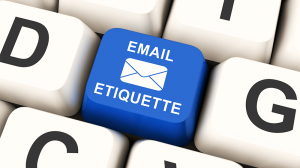Email, often known as electronic mail, is a technique of exchanging digital messages between individuals. Email can be used for a wide range of purposes, such as personal and professional communication, online transactions, marketing and advertising, and the distribution of news and information. It has evolved into an indispensable tool in today’s environment, linking individuals and businesses all over the world. Email is utilized as a primary mode of communication by many people and organizations, and it is also used during conjunction with other technologies such as instant messaging and social networking. So one must know how to write and all email etiquettes that are must.

What are email etiquettes?
Email etiquettes refers to the rules and procedures for communicating successfully and professionally via email. Some important email etiquette guidelines are as follows:
- Be clear and concise in the subject field and message body
- To use a polite and professional tone and refraining from using all capital letters, exclamation marks, or emojis
- Adding your contact details in your signature
- Resist sending emails while you are angry or agitated.
- Reply to emails as soon as possible
- Prior to actually sending an email, check for and fix any problems.
- Using a business email address
- Considering the recipient’s time and attention
Following these guidelines will help to guarantee that your emails are well-received and effective in conveying the information you aim to convey.
How to write a professional email?
Writing a professional email necessitates attention to detail as well as a clear knowledge of the message’s objective and intended audience. Here are some tips for writing a professional email:
- Begin with a specific subject line: The subject line ought to be specific, informative, and convey the email’s objective.
- Properly address the recipient: Begin the email with a salutation, such as “Dear [Name],” and appropriately address the recipient.
- Be concise and clear. In the body of the email, be clear and succinct. To arrange data, use bullet points or numbered lists, and minimize using overly formal or technical terminology.
- Maintain a pleasant and professional tone throughout the email: Maintain a polite and professional tone throughout the email. Slang, emojis, and too informal language should be avoided.
- Provide a signature: In the email’s signature, add your name, title, contact information, or any relevant links or attachments.
- Proofread: revise the email before sending it to ensure that there are no errors or typos. Check that the email is simple to read and that the message is clear.
- Respect the recipient’s time and attention: Respect the recipient’s time and attention, as well as their privacy. Avoid sending irrelevant or excessively long emails.
- Use a professional email account: Use an email address that matches your name or the title of your company.
By following these steps you will be able to send a professional email that is clear, succinct, and well-received if you follow these instructions.
Importance of email
Email is a vital communication tool in today’s society since it allows people to communicate with each other quickly and efficiently no matter where they are. it is used for variety of purposes in the modern world, including:
- Email is frequently used in business communication for anything from sending invoices and proposals to scheduling meetings and connecting with clients and coworkers.
- It is also used for personal communication, enabling people to remain in touch with friends and family, give greetings and invitations, or plan events.
- Email is also used to communicate news, announcements, and information on a variety of topics, ranging from product releases to news updates & event updates.
- its a great marketing and advertising tool because it allows firms to target certain groups of individuals with customised messaging.
- Email is also used for online transactions including emailing receipts, order confirmations, and delivery alerts.
Read More: Main benefits of investing in Term insurance plans





